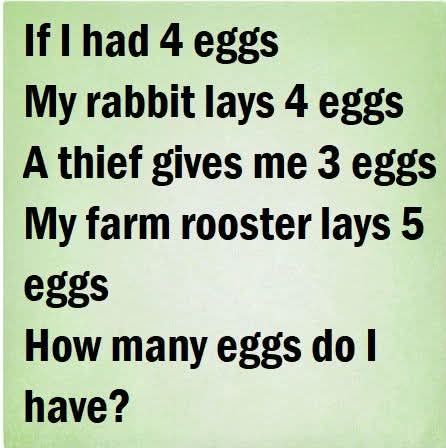Riddles are a fun and clever way to flex your brainpower and stretch your thinking beyond the ordinary. Some will test your math skills, while others are all about keen observation and sharp logic.
The riddle we’re diving into has left thousands scratching their heads. Why? Because it’s built on clever misdirection, hidden assumptions, and the way our brains instinctively process numbers. Think you can see through the trick? Let’s find out—this one’s sure to put your mind to the test!

The Riddle That’s Baffling Everyone
Ready to test your logic and attention to detail? Here’s a riddle that’s been messing with minds and sparking debates across the internet:
“If I had 4 eggs,
My rabbit lays 4 eggs,
A thief gives me 3 eggs,
My farm rooster lays 5 eggs —
How many eggs do I have?”
At first glance, it seems like a simple math puzzle. Most people quickly start adding:
- 4 eggs
- +4 from the rabbit
- +3 from the thief
- +5 from the rooster
That adds up to 16 eggs… right? Not so fast!
This riddle is a perfect example of how our brains can be tricked by assumptions and phrasing. Let’s break it down and uncover the real answer—it’s not what you think!
🎥 Watch the video: “If I Had Four Eggs” Riddle Explained

Breaking Down the Riddle, One Clue at a Time
To truly crack this riddle, we need to think critically and challenge every assumption. Let’s dive into each sentence and uncover where the trick lies:
1. “If I had 4 eggs”
The first clue is the word “if.” This is a hypothetical scenario, which means it’s not stating a fact—it’s just an assumption.
So, do you actually have 4 eggs? Nope! This line isn’t confirming that you possess any eggs at all—it’s merely setting the stage for the rest of the riddle.
2. “My rabbit lays 4 eggs”
Hold on a second—rabbits don’t lay eggs! They’re mammals, meaning they give birth to live offspring, not eggs. This is a classic example of misdirection. The statement is meant to trick you into assuming the riddle’s world operates like ours, but with a twist.

3. “A thief gives me 3 eggs”
This one’s simple: If a thief hands you 3 eggs, then, yes, you actually have 3 eggs in your possession. This is the only line in the riddle that makes sense and adds real eggs to the total.
4. “My farm rooster lays 5 eggs”
Wait a minute—roosters don’t lay eggs! Only hens, the female chickens, do that. A rooster is a male, so this line is yet another false statement designed to mislead you.
So, how many eggs does this line contribute? That’s right—zero!
The Correct Answer: How Many Eggs Do You Have?
Now, let’s take a step back and review what we’ve uncovered.
- You don’t actually have 4 eggs.
- Your rabbit doesn’t lay eggs.
- The rooster doesn’t lay eggs.
- The only real eggs in the mix come from the thief, who gave you 3 eggs.
So, how many eggs do you really have? Just 3 eggs!

After removing all the false and hypothetical statements, the only real eggs in this riddle come from the thief.
So, what’s the correct answer? 3 eggs.
Seems simple, right? But don’t feel bad if you didn’t get it—99% of people fall for it!
Why Do So Many People Get This Riddle Wrong?
This riddle is a clever trick designed to get your brain focused on numbers rather than logic. Here’s why it’s so easy to be misled:
- We assume all numbers are important. When we see numbers in a riddle, our brains immediately jump to the conclusion that all of them must be added together—even when some numbers are irrelevant or illogical.
- We don’t question the statements. Most of us don’t stop to think, “Wait… do rabbits and roosters even lay eggs?” Instead, we just accept everything at face value.
- The wording is misleading. By mixing one real statement (the thief’s eggs) with a series of impossible ones, the riddle tricks us into making a mathematical mistake.
What Can You Learn from This Riddle?
This riddle teaches us that critical thinking and attention to detail are key. Don’t be so quick to assume that everything in a problem is as it seems—sometimes the trick lies in questioning what doesn’t make sense. It also shows the importance of questioning assumptions—not everything that sounds true at first glance is, in fact, true.

Riddles like this one are a fantastic way to sharpen your thinking skills and develop valuable problem-solving techniques. Here’s what you can take away from this challenge:
- Read carefully. Pay close attention to the wording and don’t rush to conclusions.
- Think logically. If something sounds impossible, take a step back and question it!
- Slow down. The key to solving riddles isn’t speed—it’s accuracy.
Final Thoughts
This riddle is a perfect example of how our brains can be tricked by assumptions and misdirection. While it may seem straightforward once you know the answer, it’s easy to get lost in the numbers and miss the crucial details along the way.
Next time you face a tricky riddle, take your time, analyze every statement, and think critically. Who knows? You might just outsmart 99% of people!
So, did you crack the riddle? Let me know your thoughts! And if you love brain teasers, keep challenging yourself—you never know when your sharp thinking will come in handy!